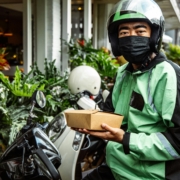
Land cleared for oil palm plantations in Merauke, Papua. Photo by Pusaka.
Despite the fact that Indonesia’s deforestation rate reached a historic low in 2020, the social, cultural, and ecological wellbeing of people whose livelihoods depend on forests has continued to suffer greatly. The indigenous Marind people in Papua, for example, have seen 1.2 million hectares of their lands and forests targeted for oil palm and timber plantations as part of the Merauke Integrated Food and Energy Estate. This has led not only to food and water insecurity but also fundamental shifts in the food and eating habits of the Marind people. Why is this happening?
Joining Talking Indonesia for a second time is Dr Sophie Chao, postdoctoral research associate in the Department of History, University of Sydney. Dr Annisa Beta chats to Chao about her extensive work with the Marind people and the intersections of race, food, and development in Papua.
Chao has recently published articles on gastrocolonialism and on the political symbolism of the monkey from the perspective of West Papuan indigenous communities. Chao’s first book, In the Shadow of the Palms: More-Than-Human Becomings in West Papua, was awarded the inaugural Duke University Press Scholars of Color First Book Award in June 2021 and is forthcoming with Duke University Press in June 2022. In her first appearance on the podcast in 2019, Chao spoke with Talking Indonesia co-host Dr Jemma Purdey about the violence, displacement, and dispossession experienced by the Marind people.
In 2021, the Talking Indonesia podcast is co-hosted by Dr Annisa Beta, Dr Dave McRae from the University of Melbourne’s Asia Institute, Dr Jemma Purdey from Monash University, and Dr Charlotte Setijadi from the Singapore Management University.
Look out for a new Talking Indonesia podcast every fortnight. Catch up on previous episodes here, subscribe via Apple Podcasts or listen via your favourite podcasting app.











